

The standard of living across time and space. A very basic question for historians is how to measure and compare the standard of living experienced by people in different historical settings.
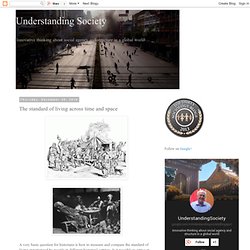
Is it possible to arrive at credible estimates of the standard of living in the Roman Empire, medieval Burgundy, nineteenth-century Britain, and twentieth-century Illinois? The moral basis for an extensive state. A recent post focused on the conception of society involved in seventeenth and eighteenth English political thinking, the theory of possessive individualism.
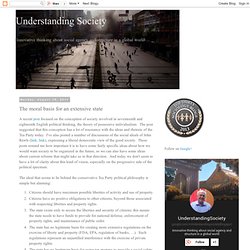
The post suggested that this conception has a lot of resonance with the ideas and rhetoric of the Tea Party today. I've also posted a number of discussions of the social ideals of John Rawls (link, link), expressing a liberal democratic view of the good society. These posts remind me how important it is to have some fairly specific ideas about how we would want society to be organized in the future, so we can also have some ideas about current reforms that might take us in that direction. And today we don't seem to have a lot of clarity about this kind of vision, especially on the progressive side of the political spectrum. The ideal that seems to lie behind the conservative Tea Party political philosophy is simple but alarming: (1974). Provides an excellent discussion of Rousseau's political theory; link. A Predator State – the worst bits of Capitalism, Communism and Feudalism « forensicstatistician.
We live in a Capitalist country, right?
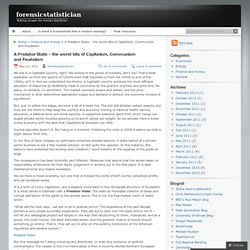
The emergence of a movement against corporate personhood in the U.S. Via CommonDreams.org:Move to Amend is a movement fighting (in the U.S.) against the damaging legal fiction of Corporate Personhood.
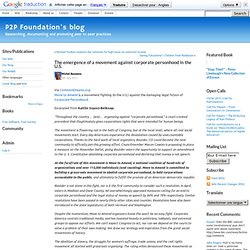
Excerpted from Kaitlin Sopoci-Belknap: “Throughout the country … (are) … organizing against “corporate personhood,” a court-created precedent that illegitimately gives corporations rights that were intended for human beings. The movement is flowering not in the halls of Congress, but at the local level, where all real social movements start. Every day Americans experience the devastation caused by unaccountable corporations.
Thanks to the hard work of local organizers, Boulder, CO could become the next community to officially join this growing effort. Maybe History Ended After All: Reconsidering Fukuyama. Mattei on the State, the Market, and the Commons. Musings on Hierarchy. Energy is cycled upwards by hierarchy, by definition.
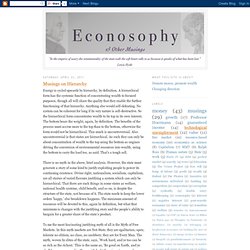
A hierarchical form has the systemic function of concentrating wealth to focused purposes, though all will share the quality that they enable the further functioning of that hierarchy. Anything else would self-defeating. No system can be coherent for long if its very nature is self-destructive. Musing about 2011 and an un-national generation. Happy New Year everyone.
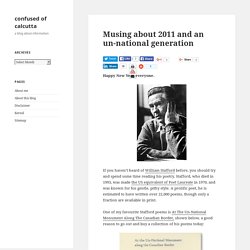
If you haven’t heard of William Stafford before, you should try and spend some time reading his poetry. Stafford, who died in 1993, was made the US equivalent of Poet Laureate in 1970, and was known for his gentle, pithy style. A prolific poet, he is estimated to have written over 22,000 poems, though only a fraction are available in print. One of my favourite Stafford poems is At The Un-National Monument Along The Canadian Border, shown below, a good reason to go out and buy a collection of his poems today: If you like what you see above, there’s also a decent archives site you can find here. There are many reasons for my liking the poem. There’s also a tangential reason for my liking the poem. For many years now, I’ve been pondering what it means to be “global”. Thinking more about un-nationalness. [Note: this is a follow-up to my post a few days introducing the theme of un-nationalness.]
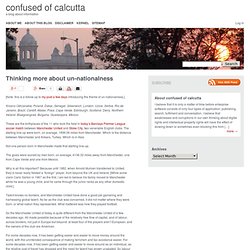
Krosno Odrzanskie, Poland. Dakar, Senegal. Greenwich, London. Uzice, Serbia. Rio de Janeiro, Brazil. These are the birthplaces of the 11 who took the field in today’s Barclays Premier League soccer match between Manchester United and Stoke City, two venerable English clubs. Not one person born in Manchester made that starting line-up. The goals were scored by men born, on average, 4106.32 miles away from Manchester, one from Cape Verde and one from Mexico. Why is all this important? Talent knows no borders, and Manchester United have done a good job garnering and harnessing global talent.
So the Manchester United of today is quite different from the Manchester United of a few decades ago. For some decades now, it has been getting easier and easier to move money around the world, with the unintended consequence of making terrorism and tax avoidance easier. Collapse Of The "Ownership Society" Bush's "ownership society" has collapsed under the dead weight of debt.
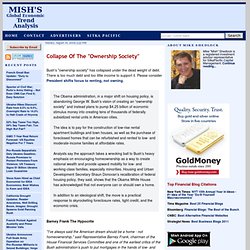
There is too much debt and too little income to support it. Please consider President shifts focus to renting, not owning. The Obama administration, in a major shift on housing policy, is abandoning George W. Bush’s vision of creating an “ownership society’’ and instead plans to pump $4.25 billion of economic stimulus money into creating tens of thousands of federally subsidized rental units in American cities.The idea is to pay for the construction of low-rise rental apartment buildings and town houses, as well as the purchase of foreclosed homes that can be refurbished and rented to low- and moderate-income families at affordable rates.Analysts say the approach takes a wrecking ball to Bush’s heavy emphasis on encouraging homeownership as a way to create national wealth and provide upward mobility for low- and working-class families, especially minorities.
Presuppositions of Policy. Wouldn’t it be great to get advice directly from Herman Daly?
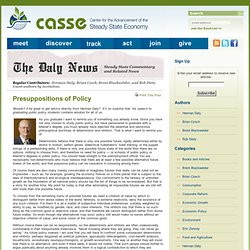
Open Society. State Entity. Anarchism. Marxist Perspective. Decline of the West. Civic State. Market State. Capitalism.